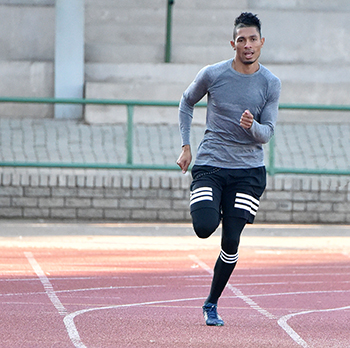Latest News Archive
Please select Category, Year, and then Month to display items
12 January 2024
|
Story Nonsindiswe Qwabe
|
Photo Sonia Small
 Since joining the UFS in 2008, Dr Grey Magaiza has worked extensively on approaches that can foster the socio-economic transformation of societies.
Since joining the UFS in 2008, Dr Grey Magaiza has worked extensively on approaches that can foster the socio-economic transformation of societies.
“The future should be one where communities can decide on their development agenda and futures. That’s the most important for me.” Dr Grey Magaiza, Deputy Director of the Centre for Gender and Africa Studies (CGAS) and Head of the Community Development programme on the Qwaqwa Campus, is passionate about capacitating communities to be agents of change and advancement. His vision for the future emphasises the empowerment of communities to take charge of their development by actively participating in decision making and the implementation of development projects that can improve their lives.
Since joining the UFS in 2008, Dr Magaiza has worked extensively on approaches that can foster the socio-economic transformation of societies. Over the years, he has crafted his research speciality into one that he is most proud of – being an interdisciplinary scientist immersed in the development of communities.
“I’m in a fortunate position of researching what I like. I say ‘fortunate’, because I’ve taken the time to understand what I’m passionate about, which is the overall field of rural livelihoods and livelihood futures – in short, community development. My research starts from an engaged university, understanding the elements that a university must use to enhance transformation and relevance to its immediate community in terms of development.”
One of the ways he has done this is by looking at social entrepreneurship as a development approach for young people in a rural setting. Through workshops with non-profit and civic organisations in Qwaqwa, Dr Magaiza has been helping these organisations to map out their needs and actively meet them through the involvement and support of external role players.
“We understand that communities are part of the national development agenda, but even that national agenda respects community knowledge and intentions and allows communities to shape their identity. A critical enabler of this is community organising. You bring back the capacity in communities to have dialogues on issues affecting them as spaces for engagement, knowledge exchange, and for people to just talk about their way forward.”
By enabling communities to define their development agenda, they can address their specific needs, challenges, and aspirations, he said. “When I look at livelihood futures, it’s quite an exciting aspect of my work – it’s like looking into a fortune tellers’ globe, because you’re not deciding for communities what they should do, but the communities themselves take those decisions.”
Wayde runs 100 m personal best in Slovenia
2017-06-21

Wayde van Niekerk is in great form leading up to the
World Championships in London in August.
Photo: Charl Devenish
“This also bodes well for my two main distances." This is what Wayde van Niekerk said according to www.iaaf.org, after running a personal best time of 9.94 in the 100 m in Velenje, Slovenia, on 20 June 2017. The Kovsie athlete improved his previous best by 0.04 seconds at the 22nd International Athletics Meeting.
Van Niekerk was referring to the other distances in which he excels – the 200 m and 400 m. The 400 m world record-holder said he was pleased with his latest run: "It's my best time and I'm glad the competition ended the way I wanted it to.”
National 200 m record and world’s fastest in 2017
His feat in the 100 m was his latest success, as he recently became the national record-holder in the 200 m again, and also the fastest man on the planet in this distance in 2017. After he ran a 19.90, the world’s fastest this year, when he won the South African title in Potchefstroom in April, the American Christian Coleman (19.85) improved on that.
However, Van Niekerk ran a 19.84 in the 200 m at the Racers Grand Prix in Kingston, Jamaica, on 11 June 2017. This was 0.06 seconds quicker than his personal best, and 0.03 seconds better than Anaso Jobodwana’s national record of 19.87.
Same pace a second time in a week
It was also the second time in a week that he ran a 19.84 in the 200 m. This after he did it on a temporary built track at the Boost Boston Games on 4 June 2017. The race was run on a straight street course and was therefore not officially recognised as a record.
He seems to be in good shape leading up to his attempt to run a double, his favourite 400 m and the 200 m, at the World Championships in London, England, in August.